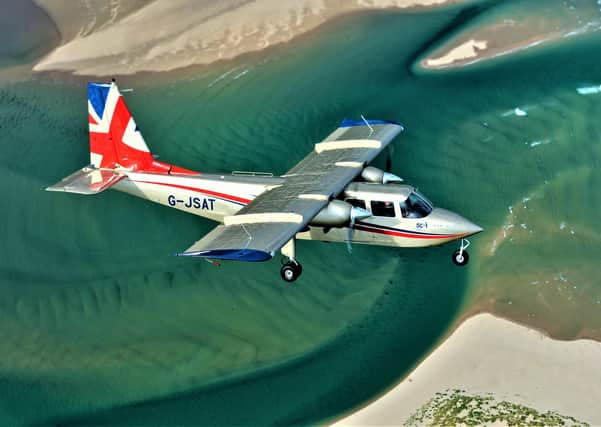PSNI aeroplane forced to rely on an iPad to navigate after catastrophic double engine ‘flameout’ saw it plunge a mile out of the sky in 90 seconds


The extraordinary details of the accident have been revealed in a forensically-detailed report, released this week by the Air Accident Investigations Branch.
The aircraft had been flying at a height of 7,000ft (1.3 miles) last November 12, after taking off from Aldergrove in the east of the Province just after 8pm.
Advertisement
Hide AdAdvertisement
Hide AdWhat happened next sent in on a dramatic descent out of the sky, before the pilot eventually managed to land in the dark on a wet runway at closed and unlit airport.
The plane was a Britten-Norman 2T-4S Islander – described by the manufacturer as being a “militarised” version of a civilian light aircraft (similar to the one pictured here, but without the Union livery).
At around 8.45pm, the pilot – a 59-year-old man with a commercial licence – noticed a problem with the engines.
The torque (the rotating force) of the Rolls-Royce turbo-propellors began reducing, and the plane started to slow down.
Advertisement
Hide AdAdvertisement
Hide AdHe increased the power, but still they kept slowing, and he noticed then that the turbine gas temperature inside the engines had reached their upper limit of 927C (about 1,700F).
The pilot announced to his two passengers that he was returning to Aldergrove.
The report goes on to say: “The pilot recalled that during the subsequent left turn the right engine failed, stating: ‘I was so startled I did not do any immediate drills but concentrated on maintaining control of the aircraft.’
“Given the already evident engine issues he was now concerned that the second engine would also fail.
Advertisement
Hide AdAdvertisement
Hide Ad“He recalled that as he thought this, the left engine failed.”
The failures (called “flameouts” in the report) meant the aircraft began gliding towards the ground.
After falling for about 90 seconds the pilot tried to restart the engines from a height of 2,100ft (0.3 miles).
To make matters worse, “the aircraft’s topographical moving map display... requires electrical supply from the generators and so was lost when the engines stopped”.
Advertisement
Hide AdAdvertisement
Hide AdInstead the pilot had to rely on an iPad from one of his two passengers, which showed him he was over Lough Foyle.
By the time both engines kicked in, the plane was less than 1,500ft above sea level.
The pilot could make out the runway at the Derry City Airport from the gleam of ambient light bouncing off the wet tarmac, and landed the plane.
The investigators found that “it is likely the engine anti-icing system was not selected ‘on’ before entry into cloud”, and that a “build-up of ice in the engine ducts” probably caused the flameouts.
Advertisement
Hide AdAdvertisement
Hide AdIn addition, the pilot’s “limited recent experience in icing conditions was likely to have been a contributory factor”.
The pilot had also been growing increasingly concerned for about 12 months that his contract would not be renewed, and it had begun affecting his sleep – leading to “stress and fatigue [which] could have affected his performance”.
In response, the operator has started a standardised system of ice checks and briefings, plus “increased communications with pilots relating to mental wellbeing and access to a specific aviation-focused peer support programme”.
More from this reporter:
Advertisement
Hide AdAdvertisement
Hide AdClick here: NI Protocol described as a ‘car crash and a nightmare’ as one haulier says his firm may fold within months
A message from the Editor:
Thank you for reading this story on our website. While I have your attention, I also have an important request to make of you.
With the coronavirus lockdown having a major impact on many of our advertisers - and consequently the revenue we receive - we are more reliant than ever on you taking out a digital subscription.
Advertisement
Hide AdAdvertisement
Hide AdSubscribe to newsletter.co.uk and enjoy unlimited access to the best Northern Ireland and UK news and information online and on our app. With a digital subscription, you can read more than 5 articles, see fewer ads, enjoy faster load times, and get access to exclusive newsletters and content. Visit https://www.newsletter.co.uk/subscriptions now to sign up.
Our journalism costs money and we rely on advertising, print and digital revenues to help to support them. By supporting us, we are able to support you in providing trusted, fact-checked content for this website.
Ben Lowry
Acting Editor